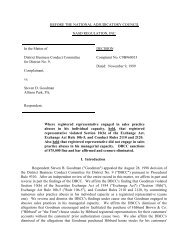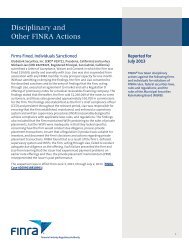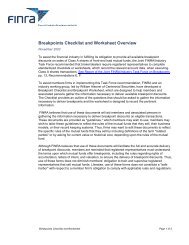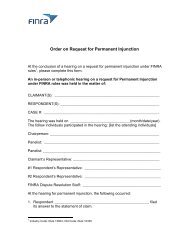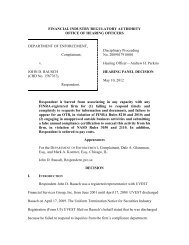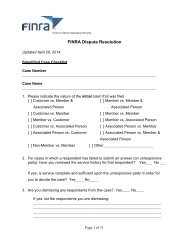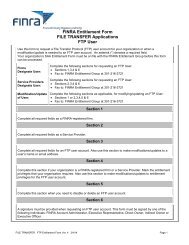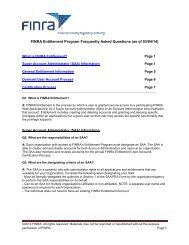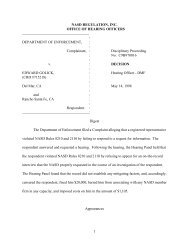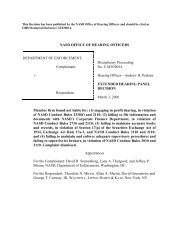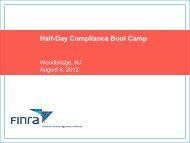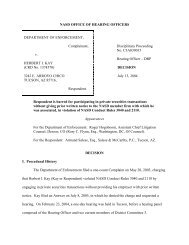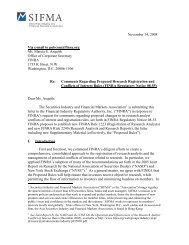FINRA Dispute Resolution Civility in Arbitration Training and Exam
FINRA Dispute Resolution Civility in Arbitration Training and Exam
FINRA Dispute Resolution Civility in Arbitration Training and Exam
Create successful ePaper yourself
Turn your PDF publications into a flip-book with our unique Google optimized e-Paper software.
<strong>FINRA</strong> <strong>Dispute</strong> <strong>Resolution</strong> <strong>Civility</strong> <strong>in</strong> <strong>Arbitration</strong><br />
Version: June 2012<br />
© 2012 F<strong>in</strong>ancial Industry Regulatory Authority, Inc. All rights reserved. Page 1 of 26
<strong>FINRA</strong> <strong>Dispute</strong> <strong>Resolution</strong> <strong>Civility</strong> <strong>in</strong> <strong>Arbitration</strong><br />
<strong>Civility</strong> <strong>in</strong> <strong>Arbitration</strong> Tra<strong>in</strong><strong>in</strong>g <strong>and</strong> <strong>Exam</strong><br />
Dear Arbitrator:<br />
The follow<strong>in</strong>g is a pr<strong>in</strong>t version of the <strong>Civility</strong> <strong>in</strong> <strong>Arbitration</strong> Tra<strong>in</strong><strong>in</strong>g. You can elect to complete<br />
this course <strong>and</strong> exam either through this pr<strong>in</strong>table version (<strong>in</strong>structions below) or onl<strong>in</strong>e,<br />
depend<strong>in</strong>g on your <strong>in</strong>dividual preference <strong>and</strong>/or comput<strong>in</strong>g environment. Most arbitrators will be<br />
able to review the material, <strong>and</strong> complete the enclosed exam <strong>in</strong> one hour.<br />
Please review the course material <strong>and</strong> complete the exam. After you complete the exam, you<br />
must send it to <strong>FINRA</strong>’s Department of Neutral Management for grad<strong>in</strong>g. There is no m<strong>in</strong>imum<br />
score required for the exam; however, you must complete <strong>and</strong> return the exam to receive<br />
credit for the course. We strongly recommend that you ma<strong>in</strong>ta<strong>in</strong> a copy of the exam for your<br />
own records.<br />
You may submit your exam to <strong>FINRA</strong> by fax or mail:<br />
By Fax: <strong>FINRA</strong> Department of Neutral Management – FAX # 646-625-6028.<br />
By Mail: <strong>FINRA</strong><br />
Attn: Luis Cruz – Neutral Management<br />
One Liberty Plaza<br />
165 Broadway, 27 th Floor<br />
New York, NY 10006<br />
Because there is no m<strong>in</strong>imum score required on the test, please do not expect a pass/fail letter<br />
from <strong>FINRA</strong>. After grad<strong>in</strong>g your exam, you can be assured that <strong>FINRA</strong> will update your arbitrator<br />
disclosure report to reflect your completion of the <strong>Civility</strong> <strong>in</strong> <strong>Arbitration</strong> Tra<strong>in</strong><strong>in</strong>g. Noth<strong>in</strong>g further<br />
is required of you with regard to this course.<br />
We hope you enjoy the course.<br />
Very truly yours,<br />
Jisook Lee<br />
© 2012 F<strong>in</strong>ancial Industry Regulatory Authority, Inc. All rights reserved. Page 2 of 26
<strong>FINRA</strong> <strong>Dispute</strong> <strong>Resolution</strong> <strong>Civility</strong> <strong>in</strong> <strong>Arbitration</strong><br />
Copyright<br />
The "<strong>FINRA</strong> <strong>Dispute</strong> <strong>Resolution</strong> <strong>Civility</strong> <strong>in</strong> <strong>Arbitration</strong>" tra<strong>in</strong><strong>in</strong>g is reproduced by permission of the<br />
F<strong>in</strong>ancial Industry Regulatory Authority, Inc. (<strong>FINRA</strong>) under a non-exclusive license. <strong>FINRA</strong> is not<br />
responsible for any errors <strong>in</strong> or omissions from the <strong>in</strong>formation conta<strong>in</strong>ed <strong>in</strong> the "<strong>FINRA</strong> <strong>Dispute</strong><br />
<strong>Resolution</strong> <strong>Civility</strong> <strong>in</strong> <strong>Arbitration</strong>" tra<strong>in</strong><strong>in</strong>g. All such <strong>in</strong>formation is provided "as is" without warranty<br />
of any k<strong>in</strong>d. <strong>FINRA</strong> makes no representations <strong>and</strong> disclaims all express, implied <strong>and</strong> statutory<br />
warranties of any k<strong>in</strong>d to the user <strong>and</strong>/or any third party, <strong>in</strong>clud<strong>in</strong>g any warranties of accuracy,<br />
timel<strong>in</strong>ess, completeness, merchantability <strong>and</strong> fitness for any particular purpose. <strong>FINRA</strong> reserves<br />
the right to amend the "<strong>FINRA</strong> <strong>Dispute</strong> <strong>Resolution</strong> <strong>Civility</strong> <strong>in</strong> <strong>Arbitration</strong>" tra<strong>in</strong><strong>in</strong>g at its discretion.<br />
<strong>FINRA</strong> shall not have any tort, contract or any other liability to any user <strong>and</strong>/or any third party.<br />
Under no circumstance will <strong>FINRA</strong> be liable for any lost profits or lost opportunity, direct, <strong>in</strong>direct,<br />
special, consequential, <strong>in</strong>cidental or punitive damages whatsoever, even if <strong>FINRA</strong> has been<br />
advised of the possibility of such damages. The terms of this disclaimer may only be amended <strong>in</strong><br />
a writ<strong>in</strong>g signed by <strong>FINRA</strong>.<br />
Course Objectives<br />
<strong>FINRA</strong> <strong>Dispute</strong> <strong>Resolution</strong> developed this course as part of its comprehensive Arbitrator Tra<strong>in</strong><strong>in</strong>g<br />
Program.<br />
This tra<strong>in</strong><strong>in</strong>g has been loosely adapted from the video titled, "<strong>Civility</strong> <strong>in</strong> <strong>Arbitration</strong>," produced by a<br />
committee of the Securities Industry Conference on <strong>Arbitration</strong> (SICA). SICA was formed to<br />
develop uniform rules govern<strong>in</strong>g arbitration disputes between broker-dealers <strong>and</strong> customers at<br />
securities <strong>in</strong>dustry self-regulatory organization (SROs).<br />
An important component of a successful arbitration hear<strong>in</strong>g is the arbitrators' ability to ma<strong>in</strong>ta<strong>in</strong> a<br />
civil <strong>and</strong> professional atmosphere <strong>in</strong> the face of contentious situations dur<strong>in</strong>g the proceed<strong>in</strong>g.<br />
This course will provide guidance to arbitrators on how to ma<strong>in</strong>ta<strong>in</strong> civility dur<strong>in</strong>g an arbitration<br />
proceed<strong>in</strong>g. Specifically, arbitrators will ga<strong>in</strong> <strong>in</strong>sight on how to:<br />
� Evaluate their obligations as arbitrators before <strong>and</strong> dur<strong>in</strong>g service on a case.<br />
� Set a proper tone for conduct<strong>in</strong>g fair <strong>and</strong> efficient hear<strong>in</strong>gs.<br />
Mission Statement<br />
<strong>FINRA</strong> <strong>Dispute</strong> <strong>Resolution</strong>'s mission is to have all its constituents–the <strong>in</strong>vest<strong>in</strong>g public, brokerage<br />
firms <strong>and</strong> their employees <strong>and</strong> neutrals (arbitrators <strong>and</strong> mediators)–view <strong>FINRA</strong> as the<br />
preem<strong>in</strong>ent provider of dispute resolution services. To accomplish this goal, it is our st<strong>and</strong><strong>in</strong>g<br />
pledge to provide impartial arbitrators who are dedicated to deliver<strong>in</strong>g fair, effective dispute<br />
resolution services.<br />
For more on <strong>FINRA</strong> <strong>and</strong> its services, see <strong>FINRA</strong>'s Web site.<br />
<strong>FINRA</strong>'s Web site. - http://www.f<strong>in</strong>ra.org/<strong>in</strong>dex.htm<br />
© 2012 F<strong>in</strong>ancial Industry Regulatory Authority, Inc. All rights reserved. Page 3 of 26
<strong>FINRA</strong> <strong>Dispute</strong> <strong>Resolution</strong> <strong>Civility</strong> <strong>in</strong> <strong>Arbitration</strong><br />
How This Course Works<br />
In this course, you will review concepts <strong>and</strong> strategies to help you address issues that come up<br />
dur<strong>in</strong>g a particular stage of an arbitration proceed<strong>in</strong>g. You will then apply your skills by mov<strong>in</strong>g<br />
through six scenarios. In each scenario, you will be asked to advise on how to deal with<br />
arbitration issues; you will then receive feedback on your decisions.<br />
Scenarios<br />
Each scenario <strong>in</strong> this m<strong>in</strong>i-course <strong>in</strong>volves a panel of three arbitrators; a public arbitrator<br />
chairperson, a public arbitrator <strong>and</strong> non-public arbitrator. Each scenario also <strong>in</strong>volves two parties;<br />
one customer claimant <strong>and</strong> one registered representative respondent, each of whom is<br />
represented by counsel.<br />
Names of Arbitrators, Parties <strong>and</strong> Parties' Counsel:<br />
� Chairperson Charles, public arbitrator<br />
� Arbitrator Adams, public arbitrator<br />
� Arbitrator Bonds, non-public arbitrator<br />
� Claimant Cox<br />
� Respondent Reilly<br />
� Counsel Carlson, attorney for the claimant<br />
� Counsel Richardson, attorney for the respondent<br />
The scenarios depicted <strong>in</strong> this tra<strong>in</strong><strong>in</strong>g course are hypothetical <strong>and</strong> have been developed for the<br />
sole purpose of tra<strong>in</strong><strong>in</strong>g arbitrators. All names <strong>and</strong> titles are fictitious <strong>and</strong> any resemblance to real<br />
persons or entities is strictly co<strong>in</strong>cidental.<br />
© 2012 F<strong>in</strong>ancial Industry Regulatory Authority, Inc. All rights reserved. Page 4 of 26
<strong>FINRA</strong> <strong>Dispute</strong> <strong>Resolution</strong> <strong>Civility</strong> <strong>in</strong> <strong>Arbitration</strong><br />
Section 1: Obligations Upon Appo<strong>in</strong>tment to a Case<br />
Determ<strong>in</strong>e Whether You Have Time to Serve on a Case<br />
In accordance with the concept of "<strong>Civility</strong> <strong>in</strong> <strong>Arbitration</strong>," arbitrators should agree to serve only on<br />
cases that they can properly conduct with<strong>in</strong> the anticipated time limits. It is not fair to the parties<br />
to accept a case if you cannot give it the proper time <strong>and</strong> attention it requires.<br />
Depend<strong>in</strong>g on the nature of the case, <strong>FINRA</strong> will contact arbitrators from the public <strong>and</strong>/or from<br />
the <strong>in</strong>dustry sector based on the parties’ rank<strong>in</strong>gs. For a typical customer case requir<strong>in</strong>g a public<br />
panel, <strong>FINRA</strong> sends the parties three arbitrator lists (one public list, one public chair qualified list<br />
<strong>and</strong> one non-public list), from which to rank <strong>and</strong> strike the arbitrators. Each list conta<strong>in</strong>s eight<br />
names, <strong>and</strong> the parties may strike up to four arbitrators on each list. The panel will be chosen<br />
from the non-struck arbitrators.<br />
<strong>FINRA</strong> staff will provide you with <strong>in</strong>formation about the case <strong>and</strong> the date <strong>and</strong> time of the hear<strong>in</strong>g.<br />
First <strong>and</strong> foremost, you should decide whether your schedule allows you to participate <strong>in</strong> the<br />
case.<br />
Determ<strong>in</strong>e Whether You Can Be Impartial<br />
Once you confirm your availability to serve, you must determ<strong>in</strong>e whether you can be impartial.<br />
You must disclose not only known conflicts, but also make a reasonable attempt to uncover<br />
potential ones. You must closely exam<strong>in</strong>e prior <strong>and</strong> current relationships with parties, parties’<br />
representatives, witnesses <strong>and</strong> other arbitrators serv<strong>in</strong>g on the same panel, <strong>and</strong> disclose any<br />
possible circumstances that may affect your judgment. This evaluation is an ongo<strong>in</strong>g obligation<br />
that you must perform at every stage of the arbitration.<br />
You should accept a case only if you are confident that you can act fairly <strong>and</strong> impartially.<br />
Review the Case Documentation<br />
After appo<strong>in</strong>t<strong>in</strong>g arbitrators, <strong>FINRA</strong> will send each arbitrator a case packet with the parties'<br />
plead<strong>in</strong>gs. You should read through the documents to determ<strong>in</strong>e aga<strong>in</strong> if you have conflicts that<br />
require disclosure, <strong>in</strong> addition to ascerta<strong>in</strong><strong>in</strong>g the parties' arguments. You should read the<br />
plead<strong>in</strong>gs carefully prior to any prehear<strong>in</strong>g conference or hear<strong>in</strong>g to refresh your recollection of<br />
the facts <strong>and</strong> issues of the case. A good arbitrator is well-acqua<strong>in</strong>ted with the case assigned<br />
before participat<strong>in</strong>g <strong>in</strong> any type of hear<strong>in</strong>g with the parties. At the conclusion of the proceed<strong>in</strong>g,<br />
arbitrators must affirm that they have each read the plead<strong>in</strong>gs <strong>and</strong> other materials filed by the<br />
parties.<br />
© 2012 F<strong>in</strong>ancial Industry Regulatory Authority, Inc. All rights reserved. Page 5 of 26
<strong>FINRA</strong> <strong>Dispute</strong> <strong>Resolution</strong> <strong>Civility</strong> <strong>in</strong> <strong>Arbitration</strong><br />
1st Scenario: Prepar<strong>in</strong>g for the Hear<strong>in</strong>g<br />
Dur<strong>in</strong>g the Initial Prehear<strong>in</strong>g Conference (IPHC), the arbitrators <strong>and</strong> the parties' counsel meet<br />
telephonically to schedule hear<strong>in</strong>g dates <strong>and</strong> set discovery <strong>and</strong> motion schedules. One of the<br />
panelists, Arbitrator Adams, does not have his calendar with him, but assumes that because the<br />
hear<strong>in</strong>g dates are several months <strong>in</strong> the future, his schedule will be clear. Everyone agrees to<br />
schedule three full-day hear<strong>in</strong>g sessions dur<strong>in</strong>g each of the upcom<strong>in</strong>g four consecutive months:<br />
August, September, October, <strong>and</strong> November. Additionally, everyone agrees to stay past 5:00 pm<br />
at the hear<strong>in</strong>gs to ensure the arbitration concludes with<strong>in</strong> the time allocated.<br />
With the dates <strong>and</strong> deadl<strong>in</strong>es set, Chairperson Charles advises the parties' counsel to double<br />
check the availability of their witnesses.<br />
Arbitrator Adams: Sorry that I'm late. I forgot that we agreed to start at 9:00 am, <strong>and</strong> not 9:30<br />
am. It has been a crazy morn<strong>in</strong>g! Before we get underway, I would like to call an executive<br />
session with my co-arbitrators to discuss a few issues.<br />
With the parties out of the room, Arbitrator Adams discusses his issues with his co-arbitrators:<br />
Arbitrator Adams: Thanks for ask<strong>in</strong>g the parties to step out so we arbitrators can talk alone. I<br />
have a few problems. As I was go<strong>in</strong>g through the arbitration papers on my way over here, I<br />
realized that the claimant’s expert witness has appeared before me <strong>in</strong> a previous arbitration.<br />
Oh, <strong>and</strong> by the way, I won’t be able to stay past 5:00 p.m. today. I forgot about a conflict I have.<br />
Also, I have a court appearance tomorrow morn<strong>in</strong>g <strong>and</strong> won’t be able to get to the arbitration<br />
hear<strong>in</strong>g until 1:00 p.m.<br />
© 2012 F<strong>in</strong>ancial Industry Regulatory Authority, Inc. All rights reserved. Page 6 of 26
<strong>FINRA</strong> <strong>Dispute</strong> <strong>Resolution</strong> <strong>Civility</strong> <strong>in</strong> <strong>Arbitration</strong><br />
Test Yourself<br />
Evaluate Arbitrator Adams’ conduct at the beg<strong>in</strong>n<strong>in</strong>g of the first hear<strong>in</strong>g day. Select an answer<br />
<strong>and</strong> review the feedback.<br />
1. Arbitrator Adams should have been more diligent about gett<strong>in</strong>g to the hear<strong>in</strong>g on time, but<br />
once he arrived, he conducted himself satisfactorily.<br />
Why wasn't this the best choice?<br />
Clearly Arbitrator Adams should have made a better effort to arrive at the hear<strong>in</strong>g on time;<br />
however, his mistakes do not stop there. He should have read the materials much earlier to<br />
review them for potential conflicts, which would have prompted him to communicate the<br />
<strong>in</strong>formation to <strong>FINRA</strong> <strong>and</strong> address the issue before the hear<strong>in</strong>g. He also should have<br />
respected the previous agreement of the parties <strong>and</strong> the arbitrators regard<strong>in</strong>g start <strong>and</strong> end<br />
times for the hear<strong>in</strong>gs.<br />
2. Arbitrator Adams should have been more prepared for the hear<strong>in</strong>g <strong>and</strong> kept his commitments<br />
to the parties <strong>and</strong> other arbitrators.<br />
Why was this the best choice?<br />
You are on target because you recognized that Arbitrator Adams failed on several fronts to<br />
adequately prepare for the hear<strong>in</strong>g <strong>and</strong> keep his commitments to the parties <strong>and</strong> arbitrators.<br />
Specifically, Arbitrator Adams failed to do the follow<strong>in</strong>g:<br />
� Read well <strong>in</strong> advance of the hear<strong>in</strong>g all of the materials forwarded by <strong>FINRA</strong>.<br />
� Promptly recognize the expert witness named <strong>in</strong> the papers <strong>and</strong> make an immediate<br />
disclosure—BEFORE the morn<strong>in</strong>g of the hear<strong>in</strong>g.<br />
� Respect the previous agreement of the parties <strong>and</strong> the arbitrators regard<strong>in</strong>g the start<br />
<strong>and</strong> end times for the hear<strong>in</strong>gs.<br />
� Most importantly, Arbitrator Adams did not take seriously his commitment to hear the<br />
case promptly, <strong>and</strong> he put his own <strong>in</strong>terests ahead of the parties.<br />
3. Arbitrator Adams performed well under the circumstances by disclos<strong>in</strong>g his conflicts on the<br />
first day of the hear<strong>in</strong>g.<br />
Why wasn't this the best choice?<br />
It’s true that Arbitrator Adams ultimately disclosed his potential conflict. However, he should<br />
have read the materials much earlier to review them for potential conflicts, which would have<br />
prompted him to communicate the <strong>in</strong>formation to <strong>FINRA</strong> <strong>and</strong> address the issue before the<br />
morn<strong>in</strong>g of the hear<strong>in</strong>g. He also should have respected the previous agreement of the parties<br />
<strong>and</strong> the arbitrators regard<strong>in</strong>g the start <strong>and</strong> end times for the hear<strong>in</strong>gs.<br />
© 2012 F<strong>in</strong>ancial Industry Regulatory Authority, Inc. All rights reserved. Page 7 of 26
<strong>FINRA</strong> <strong>Dispute</strong> <strong>Resolution</strong> <strong>Civility</strong> <strong>in</strong> <strong>Arbitration</strong><br />
Additional Tips<br />
You must make sure that you have the time to serve on a case <strong>and</strong> have no conflicts with any of<br />
the parties, representatives, witnesses, or co-arbitrators. You also must be prepared for the<br />
hear<strong>in</strong>g <strong>and</strong> act professionally at all times.<br />
Please follow these guidel<strong>in</strong>es when serv<strong>in</strong>g on a case:<br />
� Carefully read what the arbitration staff sends you. Read it all.<br />
� Take seriously the language <strong>in</strong> Canon I B of the Code of Ethics for Arbitrators <strong>in</strong><br />
Commercial <strong>Dispute</strong>s, which states that one should accept appo<strong>in</strong>tment as an arbitrator<br />
only if fully satisfied:<br />
� that he or she can serve impartially;<br />
� that he or she can serve <strong>in</strong>dependently from the parties, potential witnesses, <strong>and</strong> the<br />
other arbitrators;<br />
� that he or she is competent to serve; <strong>and</strong><br />
� that he or she can be available to commence the arbitration <strong>in</strong> accordance with the<br />
requirements of the proceed<strong>in</strong>g <strong>and</strong> thereafter to devote the time <strong>and</strong> attention to its<br />
completion that the parties are reasonably entitled to expect.<br />
� Decl<strong>in</strong>e to serve on a case if you are not available to conduct the case promptly. A major<br />
goal of arbitration is the prompt resolution of disputes. At the time of appo<strong>in</strong>tment, you<br />
should be certa<strong>in</strong> that you have the time required to hear <strong>and</strong> decide the controversy <strong>in</strong> a<br />
timely manner.<br />
� Before participat<strong>in</strong>g <strong>in</strong> the prehear<strong>in</strong>g conference, you should make sure that you have<br />
checked your calendar for availability at least several months ahead.<br />
� Make sure your calendar is up-to-date <strong>and</strong> br<strong>in</strong>g it to the prehear<strong>in</strong>g conference. Refer to<br />
it often.<br />
� If you are serv<strong>in</strong>g on another <strong>FINRA</strong> case <strong>and</strong> are uncerta<strong>in</strong> that the case is go<strong>in</strong>g<br />
forward, check with staff for that case before the prehear<strong>in</strong>g conference. This may free up<br />
potential hear<strong>in</strong>g dates.<br />
� At the prehear<strong>in</strong>g conference, exchange your home <strong>and</strong> office phone numbers, fax<br />
numbers <strong>and</strong> email addresses with your fellow arbitrators. This <strong>in</strong>formation should also<br />
be provided to <strong>FINRA</strong>.<br />
� If a last-m<strong>in</strong>ute court appearance (or similar event) <strong>in</strong>terferes with scheduled arbitration<br />
dates, see if someone else can cover for you at the other event. Try to get that event-<strong>and</strong><br />
not the arbitration-adjourned.<br />
� If you are traditionally away for an extended period of time each year, <strong>in</strong>form the staff<br />
representative when called to serve.<br />
� Be sure to consider <strong>and</strong> disclose any possible conflicts with any of the participants <strong>in</strong> the<br />
case. For example, prior experience with a party’s expert witness is not necessarily<br />
grounds for removal from a case; however, <strong>in</strong>tentional failure to disclose may be grounds<br />
to remove you entirely from <strong>FINRA</strong>’s roster. If you believe your experience with someone<br />
<strong>in</strong>volved <strong>in</strong> the case (e.g., a witness) may prejudice you, withdraw from the case <strong>and</strong> give<br />
your reasons to the staff only.<br />
� Before agree<strong>in</strong>g to stay after 5:00 p.m., consider whether you are able-physically <strong>and</strong><br />
mentally-to keep this schedule. Remember that a person’s mental acuity may decl<strong>in</strong>e<br />
later <strong>in</strong> the day.<br />
Code of Ethics for Arbitrators <strong>in</strong> Commercial <strong>Dispute</strong>s: -<br />
http://www.f<strong>in</strong>ra.org/<strong>Arbitration</strong>Mediation/Rules/RuleGuidance/P009525<br />
© 2012 F<strong>in</strong>ancial Industry Regulatory Authority, Inc. All rights reserved. Page 8 of 26
<strong>FINRA</strong> <strong>Dispute</strong> <strong>Resolution</strong> <strong>Civility</strong> <strong>in</strong> <strong>Arbitration</strong><br />
2nd Scenario: Argumentative Parties<br />
Once the chairperson has called the hear<strong>in</strong>g to order <strong>and</strong> set the tone for the arbitration<br />
proceed<strong>in</strong>g, the next task is to ma<strong>in</strong>ta<strong>in</strong> that tone as the parties present their cases.<br />
After the <strong>in</strong>troductory statements by Chairperson Charles, the parties beg<strong>in</strong> their open<strong>in</strong>g<br />
statements with Claimant's Counsel Carlson mak<strong>in</strong>g the first statement.<br />
Counsel Carlson: Before I make my open<strong>in</strong>g statements, I want to first state for the record that<br />
Respondent's Counsel Richardson cont<strong>in</strong>ues to deny my client a fair hear<strong>in</strong>g by refus<strong>in</strong>g to<br />
produce discovery. It has been months, <strong>and</strong> still, I have not received the commission runs <strong>and</strong>...<br />
Counsel Richardson: I object to your accusations of <strong>in</strong>adequate discovery. If anyone is guilty of<br />
<strong>in</strong>adequate discovery production it is you. I have asked for months for tax returns with no<br />
response, which is <strong>in</strong> clear violation of the Discovery Guide!!<br />
Before too long, the parties' attorneys are scream<strong>in</strong>g at each other.<br />
Discovery Guide: -<br />
http://www.f<strong>in</strong>ra.org/<strong>Arbitration</strong>Mediation/Rules/RuleGuidance/DiscoveryGuide/<strong>in</strong>dex.htm<br />
© 2012 F<strong>in</strong>ancial Industry Regulatory Authority, Inc. All rights reserved. Page 9 of 26
<strong>FINRA</strong> <strong>Dispute</strong> <strong>Resolution</strong> <strong>Civility</strong> <strong>in</strong> <strong>Arbitration</strong><br />
Test Yourself<br />
How should the panel ma<strong>in</strong>ta<strong>in</strong> control of the hear<strong>in</strong>g? Select an answer <strong>and</strong> review the<br />
feedback.<br />
1. The panel should rema<strong>in</strong> quiet <strong>and</strong> allow the parties the opportunity to vent their frustration<br />
on the record.<br />
Why wasn't this the best choice?<br />
While the hear<strong>in</strong>g is the parties' process, <strong>and</strong> they should be allowed some leeway to express<br />
their concerns, Chairperson Charles should not allow the parties to argue with each other <strong>in</strong> a<br />
non-constructive manner. He should rem<strong>in</strong>d the parties to be civil <strong>and</strong> professional dur<strong>in</strong>g the<br />
proceed<strong>in</strong>g. He should also rem<strong>in</strong>d them to limit their open<strong>in</strong>g statements to a brief, nonargumentative<br />
outl<strong>in</strong>e of what they <strong>in</strong>tend to prove at the hear<strong>in</strong>g <strong>and</strong> to address any<br />
comments/objections to the panel <strong>and</strong> not to each other.<br />
2. Chairperson Charles should admonish the parties on the record <strong>and</strong> talk to each party<br />
separately about their outst<strong>and</strong><strong>in</strong>g issues.<br />
Why wasn't this the best choice?<br />
Chairperson Charles may politely <strong>and</strong> firmly rem<strong>in</strong>d the parties on the record to rema<strong>in</strong> civil<br />
<strong>and</strong> professional dur<strong>in</strong>g the hear<strong>in</strong>g at all times. However, it is never appropriate for an<br />
arbitrator to speak to parties separately outside the presence of all parties. This is ex parte<br />
communication <strong>and</strong> may create a perception of bias. Because the arbitrator <strong>and</strong> party are<br />
speak<strong>in</strong>g separately away from the other parties, one is not sure of what they discussed.<br />
3. Chairperson Charles should rem<strong>in</strong>d the parties to limit their open<strong>in</strong>g statements to a brief,<br />
non-argumentative outl<strong>in</strong>e of what they <strong>in</strong>tend to prove at the hear<strong>in</strong>g <strong>and</strong> not to <strong>in</strong>terrupt<br />
each other dur<strong>in</strong>g the open<strong>in</strong>g statements. He should also rem<strong>in</strong>d the parties to direct<br />
comments/objections to the panel <strong>and</strong> not to each other.<br />
Why was this the best choice?<br />
Chairperson Charles should step <strong>in</strong> <strong>and</strong> rega<strong>in</strong> control of the hear<strong>in</strong>g, rem<strong>in</strong>d<strong>in</strong>g the parties to<br />
behave appropriately, before their behavior escalates.<br />
© 2012 F<strong>in</strong>ancial Industry Regulatory Authority, Inc. All rights reserved. Page 10 of 26
<strong>FINRA</strong> <strong>Dispute</strong> <strong>Resolution</strong> <strong>Civility</strong> <strong>in</strong> <strong>Arbitration</strong><br />
Additional Tips<br />
The chairperson should ma<strong>in</strong>ta<strong>in</strong> control by:<br />
� Hold<strong>in</strong>g professional, fair, <strong>and</strong> neutral proceed<strong>in</strong>gs, both <strong>in</strong> fact <strong>and</strong> <strong>in</strong> appearance.<br />
� Rem<strong>in</strong>d<strong>in</strong>g parties that they should limit their open<strong>in</strong>g <strong>and</strong> clos<strong>in</strong>g statements to a brief,<br />
non-argumentative outl<strong>in</strong>e of what they <strong>in</strong>tend to prove at the hear<strong>in</strong>g.<br />
� Encourage parties not to <strong>in</strong>terrupt open<strong>in</strong>g <strong>and</strong> clos<strong>in</strong>g statements. Objections, if any,<br />
should be made after the statement at issue concludes.<br />
� Rem<strong>in</strong>d<strong>in</strong>g parties to direct comments/objections to the panel <strong>and</strong> not to each other.<br />
� Insist<strong>in</strong>g that the parties act <strong>in</strong> a civil manner.<br />
� Rem<strong>in</strong>d<strong>in</strong>g the parties to follow the rules of common courtesy <strong>and</strong> etiquette <strong>and</strong> refer<br />
them to the "Top Ten St<strong>and</strong>ards of Good Practice at <strong>Arbitration</strong> Hear<strong>in</strong>gs."<br />
� Call<strong>in</strong>g for a break to let everyone collect themselves.<br />
� Consider<strong>in</strong>g sanction<strong>in</strong>g the parties, such as impos<strong>in</strong>g <strong>in</strong>terim costs.<br />
� Adjourn<strong>in</strong>g the hear<strong>in</strong>g, if necessary.<br />
"Top Ten St<strong>and</strong>ards of Good Practice at <strong>Arbitration</strong> Hear<strong>in</strong>gs."-<br />
http://www.f<strong>in</strong>ra.org/web/idcplg?IdcService=GET_PROBLEM_PAGE&siteId=www.f<strong>in</strong>ra.org&siteR<br />
elativeUrl=/<strong>Arbitration</strong>Mediation/ResourcesforParties/p009563<br />
© 2012 F<strong>in</strong>ancial Industry Regulatory Authority, Inc. All rights reserved. Page 11 of 26
<strong>FINRA</strong> <strong>Dispute</strong> <strong>Resolution</strong> <strong>Civility</strong> <strong>in</strong> <strong>Arbitration</strong><br />
3rd Scenario: To Proceed or to Adjourn?<br />
After open<strong>in</strong>g statements, Respondent's Counsel Richardson advises the arbitrators that<br />
Respondent's primary witness is not available to attend the hear<strong>in</strong>g.<br />
Counsel Richardson: Unfortunately due to a personal conflict our primary witness is not<br />
available to provide live testimony at today's hear<strong>in</strong>g, but he will be available by teleconference.<br />
Or, we could adjourn for the day <strong>and</strong> resume when the witness will be available.<br />
Counsel Carlson: I object to the witness testify<strong>in</strong>g via teleconference. I won't be able to crossexam<strong>in</strong>e<br />
the witness effectively, the witness won't be able to review the documents dur<strong>in</strong>g<br />
exam<strong>in</strong>ation, <strong>and</strong> the panel won't be able to accurately judge the witness's veracity over the<br />
phone. I can't agree to adjournment either! My client went to great lengths <strong>and</strong> expense to be<br />
here today.<br />
Chairperson Charles: Why is this the first time the parties are rais<strong>in</strong>g this issue? Why didn't<br />
Counsel Richardson br<strong>in</strong>g this to our attention earlier?<br />
© 2012 F<strong>in</strong>ancial Industry Regulatory Authority, Inc. All rights reserved. Page 12 of 26
<strong>FINRA</strong> <strong>Dispute</strong> <strong>Resolution</strong> <strong>Civility</strong> <strong>in</strong> <strong>Arbitration</strong><br />
Test Yourself<br />
Which BEST reflects what the arbitrators should do? Select an answer <strong>and</strong> review the<br />
feedback.<br />
1. The arbitrators should not adjourn the case. An adjournment would <strong>in</strong>terfere with Claimant<br />
Cox's right to a fair <strong>and</strong> expeditious hear<strong>in</strong>g.<br />
Why wasn't this the best choice?<br />
While deny<strong>in</strong>g the motion would allow Claimant Cox to proceed expeditiously with her case,<br />
disallow<strong>in</strong>g the testimony of Respondent Reilly's key witness may prejudice him <strong>in</strong> present<strong>in</strong>g<br />
the best case. The panel should exam<strong>in</strong>e both sides before issu<strong>in</strong>g a rul<strong>in</strong>g.<br />
2. Before the panel rules on the postponement request, it should balance the equities of<br />
potential prejudice aga<strong>in</strong>st a speedy resolution of the matter. The panel should also consider<br />
possible alternatives to accommodate the <strong>in</strong>terests of both parties.<br />
Why was this the best choice?<br />
Before the panel rules on any motion, it should weigh the probative value of grant<strong>in</strong>g the<br />
motion aga<strong>in</strong>st possible prejudice. In this case, the panel should also encourage cooperation<br />
between the parties to come up with a compromise that would satisfy both parties.<br />
3. The arbitrators should adjourn the case. The witness is crucial to Respondent Reilly's case,<br />
<strong>and</strong> he will not receive a fair hear<strong>in</strong>g without the live testimony of the witness.<br />
Why wasn't this the best choice?<br />
While grant<strong>in</strong>g the motion may allow Respondent Reilly to present an optimum case by<br />
hav<strong>in</strong>g his key witness testify live at the hear<strong>in</strong>g, the delay may disadvantage Claimant Cox's<br />
case. The panel should exam<strong>in</strong>e both sides before issu<strong>in</strong>g a rul<strong>in</strong>g.<br />
Additional Tips<br />
Before rul<strong>in</strong>g on the motion, the panel must:<br />
� Balance the equities of potential prejudice aga<strong>in</strong>st a speedy resolution of the matter.<br />
� Consider the relevance of the miss<strong>in</strong>g witness.<br />
� Weigh the probative value aga<strong>in</strong>st possible prejudice.<br />
� See if there are ways to proceed while still avoid<strong>in</strong>g potential prejudice.<br />
� Consider tak<strong>in</strong>g witnesses out of turn.<br />
� Consider stay<strong>in</strong>g later <strong>in</strong> the even<strong>in</strong>g or work<strong>in</strong>g on a weekend.<br />
� Consider assess<strong>in</strong>g an <strong>in</strong>terim fee.<br />
� Be consistent <strong>in</strong> similar rul<strong>in</strong>gs of this nature.<br />
Rem<strong>in</strong>d the parties to act cooperatively. This <strong>in</strong>cludes hav<strong>in</strong>g witnesses available when hear<strong>in</strong>gs<br />
are scheduled <strong>and</strong> promptly notify<strong>in</strong>g each other if an event arises which might prevent the<br />
hear<strong>in</strong>g from tak<strong>in</strong>g place.<br />
© 2012 F<strong>in</strong>ancial Industry Regulatory Authority, Inc. All rights reserved. Page 13 of 26
<strong>FINRA</strong> <strong>Dispute</strong> <strong>Resolution</strong> <strong>Civility</strong> <strong>in</strong> <strong>Arbitration</strong><br />
4th Scenario: Communicat<strong>in</strong>g with Your Fellow Arbitrators<br />
Dur<strong>in</strong>g cross-exam<strong>in</strong>ation of one of the Claimant's witnesses, Chairperson Charles <strong>and</strong> Arbitrator<br />
Bonds have a private conversation.<br />
In a very quiet tone, Chairperson Charles tells Arbitrator Bonds the follow<strong>in</strong>g:<br />
Chairperson Charles: Let's be sure to ask the witness whether he remembers document X.<br />
Arbitrator Bonds responds to Chairperson Charles:<br />
Arbitrator Bonds: Yes, let's ask about document X. And don't forget to ask about the<br />
attachments to document X.<br />
Arbitrator Adams: (loudly <strong>and</strong> visibly agitated) "Hey, what am I miss<strong>in</strong>g? I'd like to be part of this<br />
discussion too!"<br />
© 2012 F<strong>in</strong>ancial Industry Regulatory Authority, Inc. All rights reserved. Page 14 of 26
<strong>FINRA</strong> <strong>Dispute</strong> <strong>Resolution</strong> <strong>Civility</strong> <strong>in</strong> <strong>Arbitration</strong><br />
Test Yourself<br />
Evaluate the arbitrators' conduct dur<strong>in</strong>g the hear<strong>in</strong>g. Select an answer <strong>and</strong> review the<br />
feedback.<br />
1. Arbitrators should not have private conversations dur<strong>in</strong>g the hear<strong>in</strong>g <strong>and</strong> disrupt the<br />
proceed<strong>in</strong>gs. Therefore, Arbitrator Adams was justified <strong>in</strong> voic<strong>in</strong>g his protest aga<strong>in</strong>st the<br />
private communication between Chairperson Charles <strong>and</strong> Arbitrator Bonds.<br />
Why wasn't this the best choice?<br />
While it is not appropriate for arbitrators to have a private conversation <strong>in</strong> front of the parties<br />
dur<strong>in</strong>g the hear<strong>in</strong>g, an arbitrator should not have an outburst dur<strong>in</strong>g a hear<strong>in</strong>g <strong>in</strong> front of the<br />
parties. Additionally, an outburst may <strong>in</strong>dicate to the parties that there is discord among the<br />
panelists. Arbitrators should always present a united front <strong>and</strong> work out any differences <strong>in</strong> an<br />
executive session.<br />
2. Arbitrators may discuss issues privately dur<strong>in</strong>g the hear<strong>in</strong>g to avoid <strong>in</strong>terrupt<strong>in</strong>g the process<br />
to call an executive session. However, Arbitrator Adams should not have disrupted the<br />
hear<strong>in</strong>g by shout<strong>in</strong>g out loud that he wanted to be <strong>in</strong>cluded <strong>in</strong> the conversation.<br />
Why wasn't this the best choice?<br />
Arbitrators should not delay the hear<strong>in</strong>g with unnecessary executive sessions, however, it is<br />
not appropriate to conduct a private conversation <strong>in</strong> front of the parties dur<strong>in</strong>g a hear<strong>in</strong>g or<br />
shout out loud that you would like to be <strong>in</strong>cluded <strong>in</strong> the conversation.<br />
3. Chairperson Charles <strong>and</strong> Arbitrator Bonds should not have had a private conversation<br />
dur<strong>in</strong>g the hear<strong>in</strong>g. However, Arbitrator Bonds should not have shouted out loud that he<br />
wanted to be <strong>in</strong>cluded <strong>in</strong> the conversation. Instead, the arbitrators should have called an<br />
executive session to discuss issues privately.<br />
Why was this the best choice?<br />
The arbitrators should not have engaged <strong>in</strong> a private conversation dur<strong>in</strong>g the hear<strong>in</strong>g <strong>in</strong> front<br />
of the parties. The arbitrator also should not have announced out loud that he wanted to be<br />
<strong>in</strong>cluded <strong>in</strong> the conversation. If an issue requires discussion among the panelists, the<br />
chairperson or panelist should call for an executive session.<br />
© 2012 F<strong>in</strong>ancial Industry Regulatory Authority, Inc. All rights reserved. Page 15 of 26
<strong>FINRA</strong> <strong>Dispute</strong> <strong>Resolution</strong> <strong>Civility</strong> <strong>in</strong> <strong>Arbitration</strong><br />
Additional Tips<br />
The chairperson is responsible for ma<strong>in</strong>ta<strong>in</strong><strong>in</strong>g the decorum of the proceed<strong>in</strong>g. By do<strong>in</strong>g so, the<br />
chairperson preserves the <strong>in</strong>tegrity of the arbitration process <strong>and</strong> allows the hear<strong>in</strong>g to cont<strong>in</strong>ue <strong>in</strong><br />
a fair <strong>and</strong> efficient manner.<br />
In all <strong>in</strong>stances, arbitrators should manage their own behavior as well as the parties' behavior. In<br />
the current scenario, the arbitrators should not have had a private conversation dur<strong>in</strong>g the<br />
hear<strong>in</strong>g <strong>in</strong> front of the parties. The arbitrator also should not have announced out loud that he<br />
wanted to be <strong>in</strong>cluded <strong>in</strong> the conversation. If an issue requires discussion among the panelists,<br />
the chairperson or panelist should call for an executive session.<br />
Here are some additional tips on how to act professionally at all times:<br />
� Preside with an even h<strong>and</strong>.<br />
� Be fair <strong>and</strong> impartial -- both <strong>in</strong> appearance <strong>and</strong> <strong>in</strong> fact -- when address<strong>in</strong>g parties <strong>and</strong><br />
their counsel.<br />
� Do not act overly friendly or hostile to one party.<br />
� Treat the parties, representatives, witnesses, fellow arbitrators <strong>and</strong> <strong>FINRA</strong> staff with<br />
respect <strong>and</strong> courtesy.<br />
� Give all parties an equal opportunity to be heard.<br />
� Always avoid ex parte communications. Avoid be<strong>in</strong>g alone with one party. This <strong>in</strong>cludes<br />
rema<strong>in</strong><strong>in</strong>g <strong>in</strong> the hear<strong>in</strong>g room with one party, shar<strong>in</strong>g an elevator, st<strong>and</strong><strong>in</strong>g <strong>in</strong> the hallway<br />
or visit<strong>in</strong>g the restroom, etc.<br />
� Avoid withdraw<strong>in</strong>g from a case due to schedul<strong>in</strong>g conflicts.<br />
� Do not "double-book" hear<strong>in</strong>gs for the same day.<br />
� Be flexible, especially with regard to mutual requests from parties.<br />
� Do not create repeated <strong>and</strong> rout<strong>in</strong>e schedul<strong>in</strong>g problems.<br />
� Be prepared for conferences <strong>and</strong> hear<strong>in</strong>gs.<br />
� Abide by the Code of <strong>Arbitration</strong> Procedure <strong>and</strong> the Code of Ethics for Arbitrators <strong>in</strong><br />
Commercial <strong>Dispute</strong>s.<br />
Code of <strong>Arbitration</strong> Procedure: -<br />
http://www.f<strong>in</strong>ra.org/<strong>Arbitration</strong>Mediation/Rules/Codeof<strong>Arbitration</strong>Procedure/<strong>in</strong>dex.htm<br />
Code of Ethics for Arbitrators <strong>in</strong> Commercial <strong>Dispute</strong>s: -<br />
http://www.f<strong>in</strong>ra.org/<strong>Arbitration</strong>Mediation/Rules/RuleGuidance/P009525<br />
© 2012 F<strong>in</strong>ancial Industry Regulatory Authority, Inc. All rights reserved. Page 16 of 26
<strong>FINRA</strong> <strong>Dispute</strong> <strong>Resolution</strong> <strong>Civility</strong> <strong>in</strong> <strong>Arbitration</strong><br />
5th Scenario: Ma<strong>in</strong>ta<strong>in</strong><strong>in</strong>g Confidentiality<br />
Dur<strong>in</strong>g a break <strong>in</strong> the hear<strong>in</strong>g, Arbitrator Adams <strong>and</strong> Arbitrator Bonds have a discussion <strong>in</strong> the<br />
hallway.<br />
Arbitrator Adams: Sure glad the chairperson called a break. I need to stretch my legs. I know<br />
the hear<strong>in</strong>g isn't over, but it doesn't seem to be go<strong>in</strong>g well for Claimant, does it? I don't have<br />
much sympathy for her. Did you hear the testimony about how careless she was <strong>in</strong> manag<strong>in</strong>g her<br />
<strong>in</strong>vestments? No wonder she lost money <strong>in</strong> her account.<br />
Arbitrator Bonds: Ssshhh! We shouldn't talk about the case <strong>in</strong> the open. Claimant Clara is<br />
st<strong>and</strong><strong>in</strong>g a few feet away. She probably can't hear us, but just <strong>in</strong> case...<br />
© 2012 F<strong>in</strong>ancial Industry Regulatory Authority, Inc. All rights reserved. Page 17 of 26
<strong>FINRA</strong> <strong>Dispute</strong> <strong>Resolution</strong> <strong>Civility</strong> <strong>in</strong> <strong>Arbitration</strong><br />
Test Yourself<br />
Evaluate the arbitrators' behavior dur<strong>in</strong>g the recess. Select an answer <strong>and</strong> review the<br />
feedback.<br />
1. Arbitrators may make comments about the case; however, they should make sure that a<br />
party or representative is not able to overhear the conversation.<br />
Why wasn't this the best choice?<br />
This choice only addresses one of the problems with the scenario. Arbitrators should<br />
def<strong>in</strong>itely not make comments about the case where they may be overheard by a party or a<br />
representative. Arbitrators should also refra<strong>in</strong> from mak<strong>in</strong>g judgments about a case before<br />
they have heard all the evidence.<br />
2. Arbitrators should not come to any conclusions about the case before all the evidence <strong>and</strong><br />
testimony are presented. Arbitrators should also beware of discuss<strong>in</strong>g the case <strong>in</strong> an open<br />
space where parties <strong>and</strong> representatives may overhear their conversation.<br />
Why was this the best choice?<br />
This choice hits on both errors that the arbitrators committed. They should not make<br />
premature judgments about the case before all the evidence is heard <strong>and</strong> reviewed, <strong>and</strong> they<br />
should not discuss the case aloud where parties or representatives may overhear.<br />
3. Comments made by arbitrators outside of the hear<strong>in</strong>g room are off the record, so they are<br />
free to discuss their op<strong>in</strong>ions.<br />
Why wasn't this the best choice?<br />
While it is true that private conversations among arbitrators outside of the hear<strong>in</strong>g room are<br />
off the record, arbitrators still have an obligation to be discreet with their comments <strong>and</strong> not<br />
make judgments before all evidence is heard <strong>and</strong> reviewed.<br />
© 2012 F<strong>in</strong>ancial Industry Regulatory Authority, Inc. All rights reserved. Page 18 of 26
<strong>FINRA</strong> <strong>Dispute</strong> <strong>Resolution</strong> <strong>Civility</strong> <strong>in</strong> <strong>Arbitration</strong><br />
Additional Tips<br />
Arbitrators should keep an open m<strong>in</strong>d <strong>and</strong> not judge the case until:<br />
� All the testimony <strong>and</strong> evidence have been presented.<br />
� The parties have stated that they have completed their presentations.<br />
The second arbitrator <strong>in</strong> the above scenario should have rem<strong>in</strong>ded his fellow panelists to keep an<br />
open m<strong>in</strong>d until they have evaluated the evidence.<br />
Furthermore, arbitrators should:<br />
� Never discuss the case <strong>in</strong> a public space where they might be overheard.<br />
� Be certa<strong>in</strong> that they are alone when discuss<strong>in</strong>g any aspect of a case.<br />
© 2012 F<strong>in</strong>ancial Industry Regulatory Authority, Inc. All rights reserved. Page 19 of 26
<strong>FINRA</strong> <strong>Dispute</strong> <strong>Resolution</strong> <strong>Civility</strong> <strong>in</strong> <strong>Arbitration</strong><br />
6th Scenario: Rema<strong>in</strong><strong>in</strong>g Alert Throughout the Hear<strong>in</strong>g<br />
It is late <strong>in</strong> the afternoon on the second day of the hear<strong>in</strong>g <strong>and</strong> -- admittedly -- it has been an<br />
exhaust<strong>in</strong>g day. Respondent's counsel is cross-exam<strong>in</strong><strong>in</strong>g Claimant's witness when he notices<br />
that Arbitrator Bonds seems distracted.<br />
Arbitrator Bonds: Which exhibit are we look<strong>in</strong>g at? What page? Didn't we look at this earlier?<br />
Counsel Carlson: It has been a long day. I request that we adjourn for the day <strong>and</strong> start fresh<br />
tomorrow morn<strong>in</strong>g.<br />
© 2012 F<strong>in</strong>ancial Industry Regulatory Authority, Inc. All rights reserved. Page 20 of 26
<strong>FINRA</strong> <strong>Dispute</strong> <strong>Resolution</strong> <strong>Civility</strong> <strong>in</strong> <strong>Arbitration</strong><br />
Test Yourself<br />
Should the arbitrators grant Counsel Carlson's request to adjourn the hear<strong>in</strong>g for the day? Select<br />
an answer <strong>and</strong> review the feedback.<br />
1. Yes. Arbitrators have a duty to rema<strong>in</strong> alert the hear<strong>in</strong>g <strong>and</strong> actively listen to the testimony<br />
<strong>and</strong> evidence presented. It is <strong>in</strong> the best <strong>in</strong>terest of all parties if the arbitrators grant the<br />
adjournment.<br />
Why wasn't this the best choice?<br />
While arbitrators should rema<strong>in</strong> alert <strong>and</strong> attentive dur<strong>in</strong>g the hear<strong>in</strong>g, the panel should not<br />
automatically grant an adjournment. The panel should call an executive session <strong>and</strong> discuss<br />
the request. In addition, the chairperson should counsel a fellow arbitrator if he/she is<br />
behav<strong>in</strong>g <strong>in</strong>appropriately <strong>and</strong> clearly not pay<strong>in</strong>g attention to the proceed<strong>in</strong>gs.<br />
2. No. Chairperson Charles should admonish Arbitrator Bonds on the record for fail<strong>in</strong>g to pay<br />
attention to the parties' presentations dur<strong>in</strong>g the hear<strong>in</strong>g. The hear<strong>in</strong>g should then proceed as<br />
planned.<br />
Why wasn't this the best choice?<br />
The chairperson should not admonish another arbitrator on the record <strong>in</strong> front of the parties. If<br />
counsel<strong>in</strong>g is required, the chairperson should discuss the issue <strong>in</strong> private with the arbitrator<br />
dur<strong>in</strong>g an executive session. In this case, the panel should discuss whether they are able to<br />
proceed with the hear<strong>in</strong>g before mak<strong>in</strong>g a rul<strong>in</strong>g on the postponement request.<br />
3. Maybe. Arbitrators should call an executive session <strong>and</strong> discuss the postponement request.<br />
Chairperson Charles should speak with arbitrator Bonds <strong>and</strong> advise her that she must pay<br />
attention dur<strong>in</strong>g the hear<strong>in</strong>g. The panel should discuss whether they are able to go forward<br />
with the hear<strong>in</strong>g <strong>and</strong>, once they have reached a decision, they should announce their rul<strong>in</strong>g<br />
to the parties on the record.<br />
Why was this the best choice?<br />
Before mak<strong>in</strong>g any decisions, the panel should meet <strong>in</strong> an executive session <strong>and</strong> discuss the<br />
merits of the request to determ<strong>in</strong>e the best course of action. This choice also emphasizes<br />
that the chairperson should counsel a co-arbitrator for errant behavior privately.<br />
© 2012 F<strong>in</strong>ancial Industry Regulatory Authority, Inc. All rights reserved. Page 21 of 26
<strong>FINRA</strong> <strong>Dispute</strong> <strong>Resolution</strong> <strong>Civility</strong> <strong>in</strong> <strong>Arbitration</strong><br />
Additional Tips<br />
As stated previously <strong>in</strong> this tra<strong>in</strong><strong>in</strong>g course, when sett<strong>in</strong>g the hear<strong>in</strong>g schedule you should<br />
consider whether you -- <strong>and</strong> the parties -- are able to adhere physically <strong>and</strong> mentally to the<br />
proposed schedule.<br />
While mental acuity tends to decl<strong>in</strong>e later <strong>in</strong> the day, it is not acceptable for arbitrators to give less<br />
than 100 percent of their attention to the case be<strong>in</strong>g presented to them -- no matter what the<br />
conditions. Parties <strong>and</strong> representatives have worked hard to prepare their cases, <strong>and</strong> the parties<br />
are rely<strong>in</strong>g on <strong>and</strong> expect<strong>in</strong>g dedicated arbitrators to hear their disputes.<br />
In fairness to everyone <strong>in</strong>volved <strong>and</strong> to the process, arbitrators MUST:<br />
� Listen attentatively to all testimony.<br />
� Rema<strong>in</strong> alert by tak<strong>in</strong>g notes, ask appropriate <strong>and</strong> relevant questions <strong>and</strong>/or review<br />
evidence as it is presented.<br />
� Avoid distraction with other matters dur<strong>in</strong>g the course of a conference or hear<strong>in</strong>g. This<br />
<strong>in</strong>cludes refra<strong>in</strong><strong>in</strong>g from us<strong>in</strong>g a personal communication device such as a mobile phone<br />
or BlackBerry while presid<strong>in</strong>g over the hear<strong>in</strong>g.<br />
� Try to refra<strong>in</strong> from ask<strong>in</strong>g questions that have already been asked <strong>and</strong> answered, unless<br />
the panel requires clarification.<br />
If the arbitrators are too tired to cont<strong>in</strong>ue with the hear<strong>in</strong>g <strong>in</strong> an effective manner, they should<br />
consider adjourn<strong>in</strong>g for the day.<br />
© 2012 F<strong>in</strong>ancial Industry Regulatory Authority, Inc. All rights reserved. Page 22 of 26
<strong>FINRA</strong> <strong>Dispute</strong> <strong>Resolution</strong> <strong>Civility</strong> <strong>in</strong> <strong>Arbitration</strong><br />
Arbitrator Tips (Cont<strong>in</strong>ued)<br />
If you observe a fellow arbitrator behav<strong>in</strong>g <strong>in</strong>appropriately, or display<strong>in</strong>g a demeanor or<br />
temperament unsuitable for members of our roster, be sure to report this behavior to a <strong>FINRA</strong><br />
staff member <strong>and</strong>/or complete the Arbitrator Experience Survey. After <strong>FINRA</strong>'s careful <strong>and</strong> confidential<br />
review of an evaluation form cit<strong>in</strong>g <strong>in</strong>appropriate arbitrator behavior, the arbitrator may receive<br />
counsel<strong>in</strong>g or—<strong>in</strong> egregious <strong>in</strong>stances—may be dismissed from the roster.<br />
<strong>Exam</strong>ples of <strong>in</strong>appropriate behavior <strong>in</strong>clude, but are not limited to:<br />
� fail<strong>in</strong>g to be impartial, both <strong>in</strong> appearance <strong>and</strong> <strong>in</strong> fact;<br />
� be<strong>in</strong>g rude to parties, counsel, <strong>and</strong>/or staff;<br />
� demonstrat<strong>in</strong>g an <strong>in</strong>ability to follow or grasp the issues <strong>in</strong> dispute;<br />
� be<strong>in</strong>g <strong>in</strong>flexible, especially with regard to mutual requests from parties;<br />
� caus<strong>in</strong>g repeated <strong>and</strong> rout<strong>in</strong>e schedul<strong>in</strong>g problems;<br />
� be<strong>in</strong>g unprepared for conferences <strong>and</strong> hear<strong>in</strong>gs;<br />
� be<strong>in</strong>g unwill<strong>in</strong>g to abide by the Code of <strong>Arbitration</strong> Procedure; <strong>and</strong><br />
� violat<strong>in</strong>g the Code of Ethics for Arbitrators <strong>in</strong> Commercial <strong>Dispute</strong>s.<br />
No one has the "right" to be an arbitrator, <strong>and</strong> <strong>FINRA</strong> strives to ma<strong>in</strong>ta<strong>in</strong> a roster of arbitrators of<br />
the highest quality <strong>and</strong> <strong>in</strong>tegrity. Accord<strong>in</strong>gly, reports cit<strong>in</strong>g any one of the above examples may<br />
result <strong>in</strong> an arbitrator's dismissal from our roster without notice or appeal; all such removals from<br />
the roster are kept confidential. In do<strong>in</strong>g so, we preserve the <strong>in</strong>tegrity of our entire roster, which<br />
benefits the parties, the rema<strong>in</strong><strong>in</strong>g arbitrators <strong>and</strong> the arbitration process.<br />
Arbitrator Experience Survey: -<br />
http://www.f<strong>in</strong>ra.org/web/groups/arbitrationmediation/@arbmed/@arbtors/documents/arbmed/p014776.pdf<br />
Code of <strong>Arbitration</strong> Procedure: -<br />
http://www.f<strong>in</strong>ra.org/<strong>Arbitration</strong>Mediation/Rules/Codeof<strong>Arbitration</strong>Procedure/<strong>in</strong>dex.htm<br />
Code of Ethics for Arbitrators <strong>in</strong> Commercial <strong>Dispute</strong>s: -<br />
http://www.f<strong>in</strong>ra.org/<strong>Arbitration</strong>Mediation/Rules/RuleGuidance/P009525<br />
© 2012 F<strong>in</strong>ancial Industry Regulatory Authority, Inc. All rights reserved. Page 23 of 26
<strong>FINRA</strong> <strong>Dispute</strong> <strong>Resolution</strong> <strong>Civility</strong> <strong>in</strong> <strong>Arbitration</strong><br />
Summary<br />
Summary<br />
Hav<strong>in</strong>g completed this course, you should have a better underst<strong>and</strong><strong>in</strong>g of how to:<br />
� Prepare for the hear<strong>in</strong>g<br />
� Deal with argumentative parties<br />
� Consider whether to proceed or to adjourn a hear<strong>in</strong>g<br />
� Communicate with your fellow arbitrators<br />
� Ma<strong>in</strong>ta<strong>in</strong> confidentiality<br />
� Rema<strong>in</strong> alert throughout the hear<strong>in</strong>g day<br />
Next Steps<br />
To test your underst<strong>and</strong><strong>in</strong>g of the course material, please complete the attached <strong>Civility</strong> <strong>in</strong><br />
<strong>Arbitration</strong> <strong>Exam</strong> <strong>and</strong> mail or fax it to <strong>FINRA</strong> for grad<strong>in</strong>g. Thereafter, <strong>FINRA</strong> will update your<br />
Arbitrator Disclosure Report to reflect that you have completed this course. You must complete<br />
the exam to receive credit for the course.<br />
© 2012 F<strong>in</strong>ancial Industry Regulatory Authority, Inc. All rights reserved. Page 24 of 26
<strong>FINRA</strong> <strong>Dispute</strong> <strong>Resolution</strong> <strong>Civility</strong> <strong>in</strong> <strong>Arbitration</strong><br />
<strong>FINRA</strong> <strong>Dispute</strong> <strong>Resolution</strong><br />
<strong>Civility</strong> <strong>in</strong> <strong>Arbitration</strong> Tra<strong>in</strong><strong>in</strong>g<br />
<strong>Exam</strong><br />
Name: _______________________________________ Arbitrator ID#: A_________<br />
Return Fax Number: 646-625-6028<br />
Directions:<br />
After review<strong>in</strong>g the course, you must complete <strong>and</strong> submit the follow<strong>in</strong>g exam to<br />
demonstrate your underst<strong>and</strong><strong>in</strong>g of the material. There is no m<strong>in</strong>imum score required<br />
for the test; however, you must submit it to receive credit for complet<strong>in</strong>g the<br />
course. Upon completion of the course <strong>and</strong> exam, <strong>FINRA</strong> will automatically update your<br />
disclosure profile to reflect that you completed the course.<br />
CLEARLY mark your answer.<br />
� Include your name <strong>and</strong> arbitrator ID# on EVERY page.<br />
� When you have completed the test, please FAX your pages to <strong>FINRA</strong> –<br />
Neutral Management Department at 646-625-6028.<br />
1. After the Initial Prehear<strong>in</strong>g Conference concludes, an arbitrator’s duty to<br />
<strong>in</strong>vestigate <strong>and</strong> disclose possible conflicts with the parties, counsel, witnesses or<br />
co-arbitrators cont<strong>in</strong>ues.<br />
TRUE FALSE<br />
2. Arbitrators should accept only those cases they can properly conduct with<strong>in</strong> the<br />
anticipated time limits.<br />
TRUE FALSE<br />
3. If the parties raise discovery issues dur<strong>in</strong>g the hear<strong>in</strong>g, the chairperson should sit<br />
back <strong>and</strong> allow the parties to hash out their issues without <strong>in</strong>terfer<strong>in</strong>g <strong>in</strong> the<br />
debate.<br />
TRUE FALSE<br />
4. Arbitrators should allow parties to raise any outst<strong>and</strong><strong>in</strong>g issues dur<strong>in</strong>g open<strong>in</strong>g<br />
statements.<br />
TRUE FALSE<br />
5. It is never appropriate for arbitrators to have a private conversation <strong>in</strong> front of the<br />
parties dur<strong>in</strong>g the hear<strong>in</strong>g.<br />
TRUE FALSE<br />
© 2012 F<strong>in</strong>ancial Industry Regulatory Authority, Inc. All rights reserved. Page 25 of 26
<strong>FINRA</strong> <strong>Dispute</strong> <strong>Resolution</strong> <strong>Civility</strong> <strong>in</strong> <strong>Arbitration</strong><br />
Name: _______________________________________ Arbitrator ID#: A_________<br />
6. Arbitrators should always keep an open m<strong>in</strong>d <strong>and</strong> not judge the case until all<br />
evidence <strong>and</strong> testimony have been presented.<br />
TRUE FALSE<br />
7. At the arbitrators’ discretion, parties <strong>and</strong> witnesses may rema<strong>in</strong> <strong>in</strong> the room<br />
dur<strong>in</strong>g an executive session.<br />
TRUE FALSE<br />
8. Arbitrators should always avoid ex parte communication.<br />
TRUE FALSE<br />
9. Arbitrators must always rema<strong>in</strong> alert <strong>and</strong> attentive dur<strong>in</strong>g the hear<strong>in</strong>g.<br />
TRUE FALSE<br />
10. Arbitrators should always postpone a hear<strong>in</strong>g if a witness is unable to testify <strong>in</strong><br />
person.<br />
TRUE FALSE<br />
© 2012 F<strong>in</strong>ancial Industry Regulatory Authority, Inc. All rights reserved. Page 26 of 26



